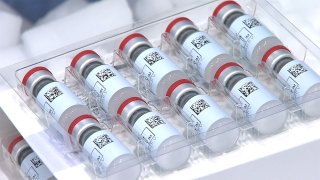
- The White House is weighing whether to temporarily lift intellectual property protections on Covid-19 vaccines and treatments.
- The move would allow other countries to replicate existing vaccines.
- Concerns have grown about the fact that the U.S. and a handful of other wealthy countries hold the right to a disproportionate amount of the global supply.
The White House is weighing whether to suspend intellectual property protections for Covid-19 vaccines and treatments, in response to pressure from developing nations and subsequent support from progressive lawmakers, according to three sources familiar with the matter.
WATCH ANYTIME FOR FREE
Stream NBC10 Boston news for free, 24/7, wherever you are. |
A temporary suspension of intellectual property protections would apply to all medical technologies to treat or prevent Covid-19. South Africa and India made a formal request to the World Trade Organization to waive the protections until the pandemic is over, but the issue was tabled without a resolution.
The White House convened a meeting of deputy-level policymakers on March 22, a senior administration official said, but they reached no final decision.
Get updates on what's happening in Boston to your inbox. Sign up for our News Headlines newsletter.
The White House's review comes in response to a letter sent in late March by House Speaker Nancy Pelosi, urging the administration to study the issue after several Democratic colleagues — including Reps. Earl Blumenauer of Oregon, Rosa DeLauro of Connecticut and Jan Schakowsky of Illinois — brought it to her attention. The letter has not been released to the public. But a senior aide said Pelosi supports the position of her members, who are in favor of issuing such a waiver, even on a temporary basis.
"The view is 'We're not safe until the world is safe,'" one of the sources said of the support from progressives on Capitol Hill.
Money Report
The move would allow other countries to replicate existing vaccines. The United States has so far approved three vaccine shots: one developed by American company Pfizer and German-based BioNTech, another produced by U.S. firm Moderna and the third made by American company Johnson & Johnson.
Concerns have grown about the U.S. and a handful of other wealthy countries owning the rights to a disproportionate amount of the global vaccine supply, while other nations struggle to inoculate their people.
The Hill first reported the support for the move from progressive lawmakers.
The Office of the U.S. Trade Representative, which would be expected to deliver a final verdict to the World Trade Organization, said saving lives and ending the pandemic remains the "top priority of the United States."
"As part of rebuilding our alliances, we are exploring every avenue to coordinate with our global partners and are evaluating the efficacy of this specific proposal by its true potential to save lives," USTR spokesman Adam Hodge told CNBC.
The pharmaceutical industry has fiercely opposed waiving the patent protections. It worries doing so will undermine innovation to fight future diseases.
CNBC contacted Pfizer, Moderna and Johnson & Johnson for comment.
Clete Willems, former deputy director of the National Economic Council, said lifting the protections would set a dangerous precedent of sharing technology.
"The administration needs to steer clear of this trap, which would undermine decades of U.S. policy against forced technology transfer to countries like China and won't directly increase vaccine distribution," Willems, now a partner at Akin Gump, told CNBC. "The model that they are pursuing with their Quad partners is much more promising."
In advance of a meeting on March 12, the Quad — a group comprise of the U.S., India, Japan and Australia that seeks to counter the influence of China — announced a complex financing deal that would enhance manufacturing of vaccines in the Indo-Pacific, where there has been a shortage. The group set a goal of delivering up to 1 billion vaccines by 2022.
Nearly 19% of American adults, and about 15% of the total U.S. population, are fully vaccinated, according to Centers for Disease Control and Prevention data.






